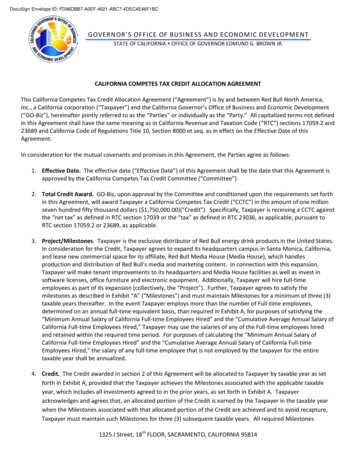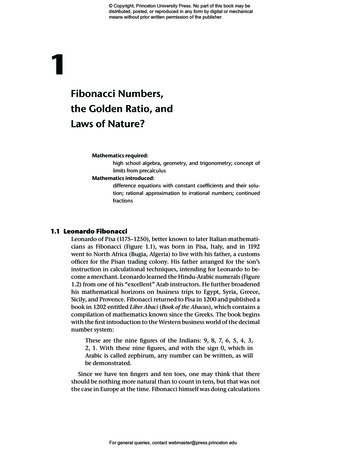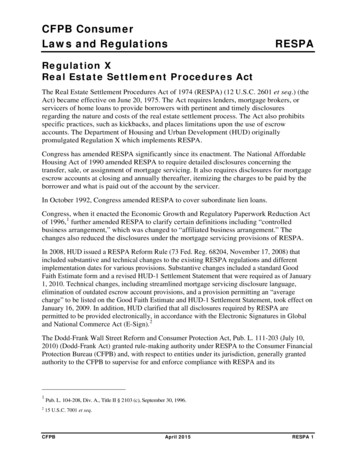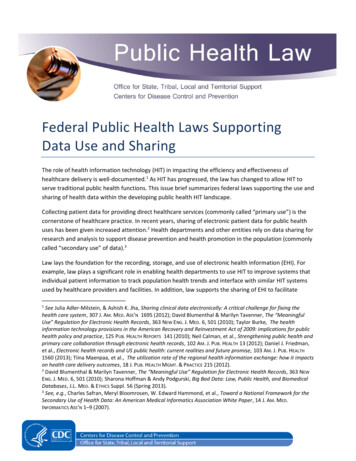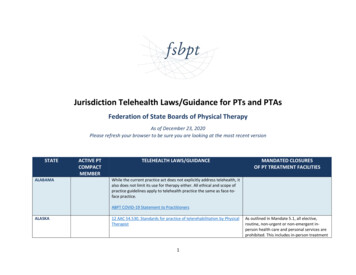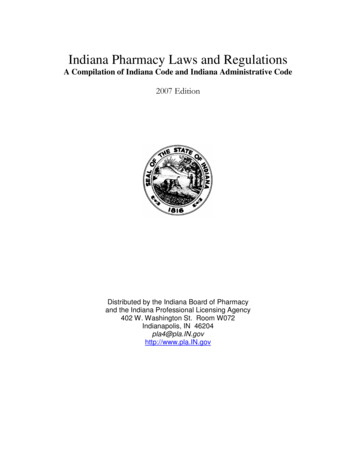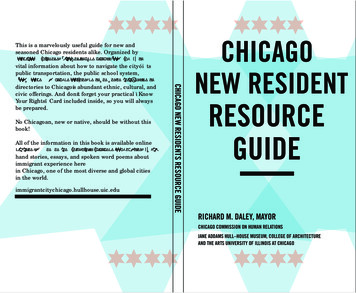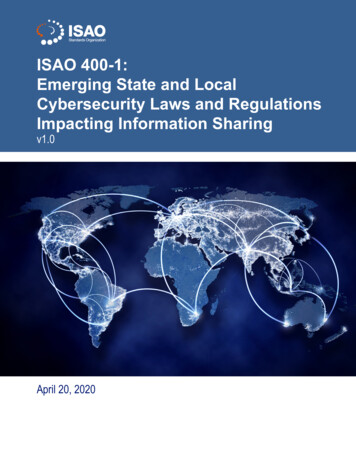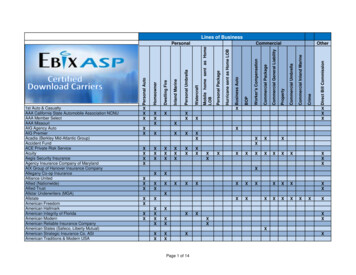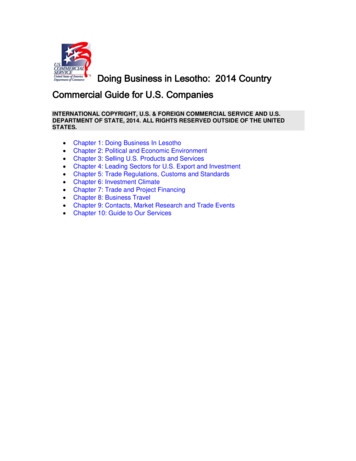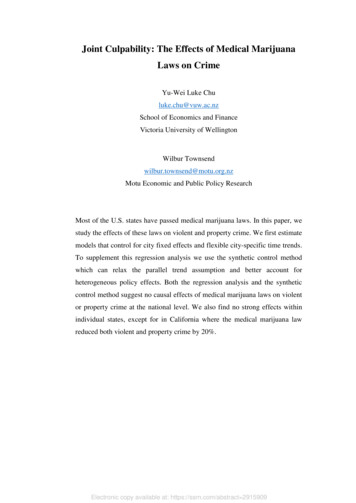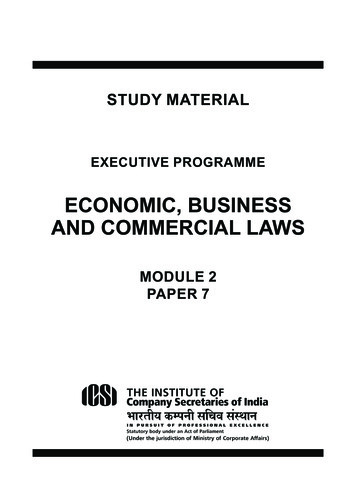
Transcription
STUDY MATERIALEXECUTIVE PROGRAMMEECONOMIC, BUSINESSAND COMMERCIAL LAWSMODULE 2PAPER 7i
THE INSTITUTE OF COMPANY SECRETARIES OF INDIATIMING OF HEADQUARTERSMonday to FridayOffice Timings – 9.00 A.M. to 5.30 P.M.Public Dealing TimingsWithout financial transactions – 9.30 A.M. to 5.00 P.M.With financial transactions – 9.30 A.M. to 4.00 si.eduE-mailinfo@icsi.eduLaser Typesetting by AArushi Graphics, Prashant Vihar, New Delhi, andPrinted at HT Media Ltd., Greater Noida/September 2020ii
EXECUTIVE PROGRAMMEECONOMIC, BUSINESS AND COMMERCIAL LAWSIndia redrafted its economic policy to usher in a new era of deregulation, liberalisation and global integration.Since then significant policy initiatives have been introduced, to provide stimulus for accelerated growth,industrial efficiency and international competitiveness. As part of reform process, the Government has alsoinitiated legislative reforms in the area of Economic, Business and Commercial laws. The Government enactedForeign Exchange Management Act, The Competition Act, 2002, Real Estate (Regulation and Development)Act, 2016 and amended Benami Transaction Prohibitions Act. Further, the Prevention of Money Laundering Actto deal with new categories of economic offences, has also been enacted. Similarly, in the area of consumerprotection and business laws, the process of reforms is going on.In the light of above developments, this study material has been prepared to provide an understanding of certainEconomic, Business and Commercial legislations which have direct bearing on the functioning of companies.The study material has been divided into three parts consisting of twenty four study lessons. Part I dealingwith Foreign Exchange Management & NBFCs consists of Study Lessons I to XI, whereas Part II dealing withCompetition Laws consists of Study Lesson XIIand Part III dealing with Business & Commercial Laws consistsof Study Lessons XIII to XXIV.This study material has been published to aid the students in preparing for the Economic, Business andCommercial Laws paper of the CS Executive Programme. It has been prepared to provide basic understandingof some of the Economic, Business and Commercial laws thereunder, which have a bearing on the conductof corporate affairs. It is part of the educational kit and takes the students step by step through each phaseof preparation stressing key concepts, principle, pointers and procedures. Company Secretaryship being aprofessional course, the examination standards are set very high, with emphasis on knowledge of concepts,applications, procedures and case laws, for which sole reliance on the contents of this study material may not beenough. Besides, as per the Company Secretaries Regulations, 1982, students are expected to be conversantwith the amendments to the laws made upto six months preceding the date of examination. The materialmay, therefore, be regarded as the basic material and must be read alongwith the original Bare Acts, Rules,Regulations, Case Law, Chartered Secretary Journal published by the Institute every month. The legislativechanges made upto June, 2020 have been incorporated in the study materialThe subject of Economic, Business and Commercial Laws is inherently complicated and is subjected to constantrefinement through new primary legislations, rules and regulations made thereunder and court decisions onspecific legal issues. It, therefore becomes necessary for every student to constantly update himself with thevarious legislative changes made as well as judicial pronouncements rendered from time to time by referring tothe Institute’s journal ‘Chartered Secretary’ and e-bulletin as well as other law/professional journals.In the event of any doubt, students may write to the Directorate of Professional Development, PerspectivePlanning & Studies of the Institute for clarification at academics@icsi.edu.Although care has been taken in publishing this study material yet the possibility of errors, omissions and/ordiscrepancies cannot be ruled out. This publication is released with an understanding that the Institute shall notbe responsible for any errors, omissions and/or discrepancies or any action taken in that behalf.Should there be any discrepancy, error or omission noted in the study material, the Institute shall be obliged ifthe same is brought to its notice for issue of corrigendum in the e-bulletin.iii
EXECUTIVE PROGRAMMEMODULE 2PAPER 7ECONOMIC, BUSINESS AND COMMERCIAL LAWS (MAX MARKS 100)ObjectivePart I : To provide expert knowledge in Foreign Exchange Management and NBFCs.Part II : To provide expert knowledge in Competition Law.Part III : To provide working knowledge in Business and Commercial Laws.SYLLABUSPart I: Foreign Exchange Management &NBFCs (40 Marks)Detailed Contents1.Reserve Bank of India Act, 1934: Central Banking functions; Monetary policy; Penalties.2.Foreign Exchange Management Act, 1999: Introduction3.Foreign Exchange Transactions & Compliances: Current and Capital Account Transactions;Acquisition &Transfer ofImmovable Property in India and Abroad; Realization and Repatriation ofForeign Exchange; Brief information of other FEMA Regulations.4.Foreign Contribution (Regulation) Act, 2010: Introduction and Object, Eligible Contributor, EligibleReceiver, Registration,Offences and Penalties.5.Foreign Direct Investments – Regulations & FDI Policy: Automatic and Approval Route of FDI;Setting up of Subsidiary/Joint Venture/Liaison Office/ Branch Office by Non-residents; Foreign PortfolioInvestments.6.Overseas Direct Investment: ODI Policy, foreign currency remittances, Setting up of Subsidiary/JointVenture/Branch Office.7.Liberalized Remittance Scheme: Investment Outside India by Indian Residents.8.External Commercial Borrowings (ECB): An Overview.9.Foreign Trade Policy & Procedure: Merchandise Exports from India Scheme (MEIS); Service Exportsfrom India Scheme(SEIS); Duty exemption / remission schemes; Export oriented units (EOUS);Electronics Hardware Technology Parks (EHTPS); Software Technology Parks (STPS); Bio-TechnologyParks (BTPS).Imports and related policies.10.Non-Banking Finance Companies (NBFCs): Definition; Types; Requirement of Registration asNBFC and exemptions from registration as NBFC; Micro Finance Institutions, Activities of NBFCs;Compliances by the NBFCs and requirements of approvals of RBI; Deposit Accepting and Non-depositiv
Accepting NBFCs; Deemed NBFC; Core Investment Company and Systemically Important CoreInvestment Companies; Peer to Peer Lending; Defaults, Adjudication, prosecutions and penalties.11.Special Economic Zones Act, 2005: Establishment of Special Economic Zones; Approval andAuthorization to Operate SEZ; Setting up of Unit; Special Economic Zone Authority.Case Laws, Case Studies & Practical AspectsPart II: Competition Law (25 Marks)12.Competition Act, 2002: Competition Policy ; Anti-Competitive Agreements; Abuse of DominantPosition; Overview of Combination and Regulation of Combinations; Competition Advocacy; CompetitionCommission of India; Appellate Tribunal.Case Laws, Case Studies & Practical AspectsPart III: Business & Commercial Laws (35 Marks)Consumer Protection13.Consumer Protection Act, 1986: Consumer Protection in India; Rights of Consumers; ConsumerDispute Redressal Forums; Nature and Scope of Remedies.14.Essential Commodities Act, 1955: Essential Commodities; Powers of Central Government; Authoritiesresponsible to administer the Act; Delegation of powers; Nature of Order passed under the Act; Seizureand Confiscation of Essential Commodities; Offences by Companies.15.Legal Metrology Act, 2009: Standard weights and measures; Power of inspection, seizure; Declarationson pre-packaged commodities; Offences and penalties.Property Law16.Transfer of Property Act, 1882: Types of Properties; Properties which cannot be Transferred; RuleAgainst Perpetuities; Lis Pendens; Provisions Relating to Sale; Mortgage, Charge, Lease, Gift andActionable Claim; Specific Performance.17.Real Estate (Regulation and Development) Act, 2016: Registration of Real Estate Project; RealEstate Agents; Real Estate Regulatory Authority; Central Advisory Council; The Real Estate AppellateTribunal; Offences, Penalties and Adjudication. Specimen Agreement for Sale between the Promoterand the Allottee; Due Diligence Reporting.Anti-Corruption Laws18.Benami Transaction Prohibitions (Act): Benami Property; Benami Transaction, Prohibition of BenamiTransaction; Authority, Adjudication of Benami property.19.Prevention of Money Laundering: Problem and adverse effect of money laundering; Methods ofmoney laundering; Offence of money laundering; Attachment, adjudication and confiscation.Business Laws20.Indian Contracts Act, 1872: Essential elements of a Valid Contract; Indemnity and Guarantee;Bailment and Pledge; Law of Agency; E-Contract; Landmark judgments.21.Specific Relief Act, 1963: Specific reliefs and defense; specific performance and defense;v
unenforceable contracts; Rescission of Contracts; Cancellation of Instruments; Declaratory Decrees;Preventive Reliefs.22.Sale of Goods Act, 1930: Essentials of a Contract of Sale; Sale Distinguished from Agreement to Sell,Bailment, Contract for Work and Labour and Hire-Purchase; Conditions and Warranties; Doctrine ofCaveat Emptor; Performance of the Contract of Sale; Landmark judgments.23.Partnership Act, 1932: Rights and Liabilities of Partners; Registration of Firms; Dissolution of Firmsand Partnership; Landmark judgments24.Negotiable Instrument Act, 1881: Negotiable Instruments and Parties; Material Alteration; Crossingand bouncing of Cheques; Dishonour of Cheques & its Remedies; Presumption of Law as to NegotiableInstruments; Landmark judgments.Case Laws, Case Studies & Practical Aspectsvi
LESSON WISE SUMMARYECONOMIC, BUSINESS AND COMMERCIAL LAWSPART I - FOREIGN EXCHANGE MANAGEMENT & NBFCSLesson 1 - Reserve Bank of India Act, 1934The Reserve Bank of India was established on April 1, 1935 in accordance with the provisions of the ReserveBank of India Act, 1934. The purposes for which the Reserve Bank of India was established as India’scentral bank have been spelt out in the preamble to the Reserve Bank of India Act, which states asfollows:(i)to regulate the issue of banknotes and the keeping of reserves with a view to securing monetarystability in India and generally to operate the currency and credit system of the country to itsadvantage; and(ii)that it is essential to have a modern monetary policy framework to meet the challenge of anincreasingly complex economy ; the primary objective of the monetary policy is to maintain pricestability while keeping in mind the objective of growth and the monetary policy framework in Indiashall be operated by the Reserve Bank of India.The objective of the lesson is to introduce the students regarding:lOrigins of the Reserve Bank of India;lBanking Functions;lIssue bank notes;lMonetary Policy Functions;lPublic Debt Functions;lForeign Exchange Management;lBanking Regulation & Supervision;lRegulation and Supervision of NBFCs;lRegulation & Supervision of Co-operative banks;lRegulation of Derivatives and Money Market Instruments;lPayment and Settlement Functions;lConsumer Protection Functions;lFinancial Inclusion and Development Functions;Lesson 2 - Foreign Exchange Management Act, 1999 – IntroductionThe Foreign Exchange Management Act, 1999 (FEMA) is an Act of the Parliament of India to consolidate andamend the law relating to foreign exchange with the objective of facilitating external trade and payments andfor promoting the orderly development and maintenance of foreign exchange market in India. The Act extendsto the whole of India and it also applies to all branches, offices and agencies outside India owned or controlledby a person resident in India and also to any contravention thereunder committed outside India by any personto whom this Act applies.vii
It is expected that, at the end of this lesson, students will, inter alia, be in a position to:lUnderstand the Concept of FEMA;lStructure and Overall Schemes of FEMA;lRules and Regulations framed by RBI under FEMA;Lesson 3 - Foreign Exchange Transactions & CompliancesThe management of foreign exchange is very important in the present day business. FEMA is a regulatorymechanism that enables the Reserve Bank of India to pass regulations and the Central Government to passrules relating to foreign exchange in tune with the Foreign Trade policy of India. The Act is more transparentin its application as it lays down the areas requiring specific permissions of the Reserve Bank/Government ofIndia on acquisition/holding of foreign exchange. It stipulate the strict compliances in case of import, export,debt funding, equity capital infusion, transfer of shares etc.The objective of the lesson is to facilitate the students to acquaint with:lConcept of Current Account Transactions and Capital Account Transactions;lProvisions of Realisation, Repatriation and Surrender of Foreign Currency;lLimits for possession or retention of foreign currency or foreign coins; andlProcedure for Adjudication, Appeal and Compounding.Lesson 4 - Foreign Contribution (Regulation) Act, 2010Foreign Contribution (Regulation) Act, 2010 regulate the acceptance and utilisation of foreign contribution orforeign hospitality by certain individuals or associations or companies and to prohibit acceptance and utilisationof foreign contribution or foreign hospitality for any activities detrimental to the national interest and for mattersconnected therewith or incidental thereto. The Act mandates that every bank or authorized person in foreignexchange shall report to specified authority, the prescribed amount of foreign remittance, source and manner inwhich foreign remittance was received and other particulars.It is expected that, at the end of this lesson, students will, inter alia, be in a position to:lRegulation of foreign contribution, foreign Source and foreign hospitality;lAccounts, Intimation, Audit and Disposal of Assets; andlInspection, Search and Seizure.Lesson 5 - Foreign Direct Investment – Regulation & PolicyForeign Direct Investment (FDI) is a major source of non-debt financial resource for the economic developmentof India. Foreign companies invest in India to take advantage of relatively lower wages, special investmentprivileges such as tax exemptions, etc. To promote Foreign Direct Investment (FDI), the Government has put inplace an investor friendly policy, wherein except for a small negative list, most sectors are open for 100% FDIunder the Automatic route.The objective of the lesson is to familiarize the students with:lEligible Investors under FDI;lEntry Routes for Investment i.e. Automatic Route, Government Route, Competent authority etc;lInstruments for Investments i.e. equity shares/fully, compulsorily and mandatorily convertibledebentures/fully, compulsorily and mandatorily convertible preference shares etc;viii
lProhibited and Permitted Sectors;lConditions of FDI in major sector i.e. E-commence activity, Insurance etc.;lConversion of ECB/lump sum fee/royalty etc. into Equity;lProvisions of FDI with respect to Issue of Rights/Bonus Shares& Employees Stock Option Scheme(ESOPS)/Sweat Equity;lAcquisition of Shares under Scheme of Merger/Demerger/Amalgamation;lModes of Payment allowed for receiving FDI in an Indian Company;lReporting of FDI i.e. Reporting of Inflow/Issue of shares/Transfer of shares etc; andlConditions and procedure for establishment of branch office (BO)/ liaison office (LO)/ project Office(PO) in India.Lesson 6 - Overseas Direct Investments (ODI)Overseas Direct Investments (ODI) refers to the investments made in the overseas entities by way of contributionto their capital or subscription to the Memorandum of Association of a foreign entity or by way of purchase ofexisting shares of a foreign entity either by market purchase or private placement or through stock exchange,but it does not include portfolio investment.Overseas investments (or financial commitment) in Joint Ventures (JV) and Wholly Owned Subsidiaries (WOS)have been recognised as important avenues for promoting global business by Indian entrepreneurs.The purpose of the lesson is to familiarize the students with:lTwo way approach to the approval of direct investment, i.e. Automatic Route and Approval Route;lProposal for making ODI under approval route and Prior RBI approval;lFinancial Commitment;lEligibility to make ODI under the Automatic Route;lPermissible Sources for Funding Overseas Direct Investment;lAcquisition/Sale of Foreign Securities by Resident Individual in India; andlObligations of Indian party which has made direct investment outside India etc.Lesson 7 - Liberalized Remittance Scheme (LRS)Liberalised Remittance Scheme was introduced on February 4, 2004 as a liberalization measure to facilitateresident individuals to remit funds abroad for permitted current or capital account transactions or combinationof both. The Scheme is available to all resident individuals including minors and not available to corporates,partnership firms, HUF and trusts.This lesson is designed to familiarize the students with:lOverview of Liberalised Remittance Scheme;lPermissible Capital Account Transactions and Current Account Transactions by an individual underLRS; andlRemittance facilities to Persons other than Individuals.ix
Lesson 8 - External Commercial Borrowings (ECB)External Commercial Borrowings are commercial loans raised by eligible resident entities from recognised nonresident entities and should conform to parameters such as minimum maturity, permitted and non-permittedend-uses, maximum all-in-cost ceiling, etc. Transactions on account of External Commercial Borrowings (ECB)are governed by clause (d) of sub-section 3 of section 6 of the Foreign Exchange Management Act, 1999(FEMA).However, ECB framework is not applicable in respect of investment in Non-convertible Debentures(NCDs) in India made by Registered Foreign Portfolio Investors (RFPIs).The objective of the lesson is to familiarize the students with:lOverview of ECB, Tracks of ECB i.e. Track I, Track II & Track III and kinds of ECB;lRoutes available for raising ECB;lProvisions of Conversion of ECB into equity;lProcedure for raising ECB; andlReporting Requirements i.e. In case of Changes in terms and conditions of ECB, Conversion of ECBinto equity etc.Lesson 9 - Foreign Trade Policy and ProcedureThe Foreign Trade Policy, 2015-20, is notified by Central Government seeks to provide astable and sustainablepolicy environment for foreign trade in merchandise and services.India’s Foreign Trade Policy (FTP) has,conventionally, been formulated for five years at a time and reviewed annually. The focus of the FTP has beento provide a framework of rules and procedures for exports and imports and a set of incentives for promotingexports.The objective of the lesson is to facilitate the students to acquaint with:lProvisions regarding Imports and Exports;lImporter-Exporter Code (IEC) Number/E-IEC;lRequired Documents for Export/Import of Goods From/into India;lMerchandise Exports from India Scheme (MEIS);lService Exports from India Scheme (SEIS);lDuty exemption / remission schemes;lExport oriented units (EOUS);lElectronics Hardware Technology Parks (EHTPS);lSoftware Technology Parks (STPS);lBio-Technology Parks (BTPS); andlImports and related policies.Lesson 10 - Non-Banking Finance Companies (NBFCs)India has financial institutions which are not banks but which accept deposits and extend credit like banks. Theseare called Non-Banking Financial Companies (NBFCs) in India. The regulation and supervision of non-bankingfinancial companies is one of the critical functions that the Reserve Bank of India (RBI) has been entrustedwith. Reserve Bank of India(RBI) Act mandates every non-banking financial company to obtain a certificateof registration from RBI and to maintain net owned fund as may be specified by RBI in the Official Gazette,x
before commencing such non-banking financial business. Further, as part of regulation and supervision of nonbanking financial companies, RBI has been conferred with the statutory powers to regulate or prohibit issueof prospectus or advertisements soliciting deposits of money by non-banking financial companies, powerto determine policy and issue directions to non-banking financial companies.The objective of the lesson is to introduce the students regarding:lTypes of NBFC;lActivities of NBFCs;lCompliances by the NBFCs;lDeposit Accepting and Non-deposit Accepting NBFCs;lCore Investment Company;lSystemically Important Core Investment Companies; andlPeer to Peer Lending.Lesson 11 - Special Economic Zones Act, 2005Special Economic Zone (SEZ) is a specifically delineated duty free enclave and shall be deemed to be foreignterritory for the purposes of trade operations and duties and tariffs. Goods and services going into theSEZ area from Domestic Tariff Area treated as exports and goods coming from the SEZ area into DTA treatedas if these are being imported.Special Economic Zone Act, 2005 to provide for the establishment, development and management of theSpecial Economic Zones for the promotion of exports and for matters connected therewith or incidental thereto.SEZ Rules, 2006 authorises company secretaries to appear before Board of Approval constituted under Section8 of the Act.The purpose of this lesson is to provide the students with:lEstablishment of Special Economic Zones;lApproval and Authorization to Operate SEZ;lSetting up of Unit; andlSpecial Economic Zone Authority.PART II- COMPETITION LAWLesson 12-Competition Act, 2002Economic theory suggests that prices and quantities in a competitive market equilibrate to levels thatgenerate efficient outcomes at a given point of time. Competition is therefore, beneficial as it providesto consumers wider choice and provides sellers with stronger incentives to minimize costs, so eliminatingwaste. Competition Act, 2002 to provide, keeping in view of the economic development of the country,for the establishment of a Commission to prevent practices having adverse effect on competition, topromote and sustain competition in the markets, to protect the interest of consumers and to ensure freedomof trade carried on by other participant in the markets in India and for matters connected therewith or incidentalthereto. Competition Act, 2002, authorizes a company secretary holding a certificate of practice to appearbefore Competition Commission of India.The objective of the lesson is to introduce the students regarding:xi
lCompetition Policy;lAnti-Competitive Agreements;lAbuse of Dominant Position;lOverview of Combination and Regulation of Combinations;lCompetition Advocacy;lCompetition Commission of India; andlRight to legal representation.PART III - BUSINESS & COMMERCIAL LAWSCONSUMER PROTECTIONLesson 13- Consumer Protection Act, 1986The Consumer Protection Act, 1986 was enacted to provide for better protection of the interests of consumersand for the purpose of making provision for establishment of consumer protection councils and other authoritiesfor the settlement of consumer disputes, etc. Consumer markets for goods and services have undergone drastictransformation since the enactment of the Consumer Protection Act in 1986.The objective of the lesson is to introduce the students regarding:lConsumer Protection in India;lRights of Consumers;lConsumer Dispute Redressal Forums; andlNature and Scope of Remedies.Lesson 14 - Essential Commodities Act, 1955The Preamble to the Act says that it is an Act to provide in the interest of the general public for the control ofthe production, supply and distribution of, and trade and commerce in, certain commodities. The dominantobject and intendment of the Act is to secure equitable distribution and availability at fair prices of essentialcommodities in the interest of the general public. The interest of the general public necessarily connotes theinterest of the consuming public and not the interest of the dealer.Necessary powers have been given to the Central Government under the Act to administer the provisions ofthe Act by issuing orders/directions notified in the official gazette and by delegating the authority to StateGovernments and administrators of Union Territories. The Central Government at its apex level isresponsible for achieving the objectives enshrined by the Parliament under this Act for the welfare andgeneral well-being of all the citizens.The purpose of this lesson is to provide the students with:lEssential Commodities;lPowers of Central Government;lAuthorities responsible to administer the Act;lSeizure and Confiscation of Essential Commodities; andlOffences by Companies.xii
Lesson 15 - Legal Metrology Act, 2009The branch of knowledge concerning weights and measures is technically known as legal metrology. In basicform, metrology is the science of measurement. Legal metrology Act, 2009 intend to establish and enforcestandards of weights and measures, regulate trade and commerce in weights, measures and other goods whichare sold or distributed by weight, measure or number and for matters connected therewith or incidental thereto.The objective of the lesson is to introduce the students regarding:lStandard weights and measures;lPower of inspection, seizure;lDeclarations on pre-packaged commodities; andlOffences and penalties.PROPERTY LAWLesson 16 - Transfer of Property Act, 1882Property has, always, been on the fundamental elements of socio economic life of an individual. Transferof Property means an act by which a living person conveys property in present, or in future, to one or moreother living persons, or to himself and one or more other living persons and “to transfer property” is toperform such an act. Consequently, the law relating to transfer of property is not only an important branch ofcivil law but also one that demands proper elucidation due to its complexity.It is expected that, at the end of this lesson, students will, inter alia, be in a position to:lUnderstand types of Properties;lKnow Rules relating to Transfer of Property;lProperties which cannot be transferred;lLis Pendens; andlUnderstand Provisions Relating to Sale; Mortgage, Charge, Lease.Lesson 17 - Real Estate (Regulation and Development) Act, 2016Parliament enacted the Real Estate (Regulation and Development) Act, 2016 which aims at protecting therights and interests of consumers and promotion of uniformity and standardization of business practicesand transactions in the real estate sector. It attempts to balance the interests of consumers and promoters byimposing certain responsibilities on both. It seeks to establish symmetry of information between the promoterand purchaser, transparency of contractual conditions, set minimum standards of accountability and a fast-trackdispute resolution mechanism.As per Section 56 of the Act, the applicant or appellant may either appear in person or authorise one or morechartered accountants or company secretaries or cost accountants or legal practitioners or any of itsofficers to present his or its case before the Appellate Tribunal or the Regulatory Authority or the adjudicatingofficer, as the case may be.The objective of the lesson is to introduce the students regarding:lRegistration of Real Estate Project;lReal Estate Agents;lReal Estate Regulatory Authority;xiii
lThe Real Estate Appellate Tribunal; andlSpecimen Agreement for Sale between the Promoter and the Allottee; Due Diligence Reporting.ANTI-CORRUPTION LAWSLesson 18 - Benami Transaction Prohibitions (Act)Benami Transactions (Prohibition) Act, 1988 defines benami transaction and benami property and also providesfor exclusions and transactions which shall not be construed benami. The legislation is also intended toeffectively prohibit benami transactions and consequently prevent circumvention of law through unfairpractices. It empowers the Government to confiscate benami property by following due procedure. It thereforepromotes equity across all citizens.The purpose of this lesson is to provide the students with:lBenami Property;lBenami Transaction;lProhibition of Benami Transaction; andlAdjudication of Benami property.Lesson 19 - Prevention of Money LaunderingThe possible social and political costs of money laundering, if left unchecked or dealt with ineffectively, areserious. Organised crime can infiltrate financial institutions, acquire control of large sectors of the economythrough investment, or offer bribes to public officials and indeed governments. The economic and politicalinfluence of criminal organisations can weaken the social fabric, collective ethical standards, and ultimately thedemocratic institutions of society. In countries transitioning to democratic systems, this criminal influence canundermine the transition. Most fundamentally, money laundering is inextricably linked to the underlyingcriminal activity that generated it. Laundering enables criminal activity to continue.The Prevention of Money-laundering Act, 2002 enacted to prevent money laundering and to provide forconfiscation of property derived from, or involved in, money laundering and for matters connected therewith orincidental thereto.The objective of the lesson is to introduce the students regarding:lProblem and adverse effect of money laundering;lMethods of money laundering;lOffence of money laundering; andlAttachment, adjudication and confiscation.BUSINESS LAWSLesson 20 - Indian Contracts Act, 1872The Law of Contract constitutes the most important branch of Mercantile or Commercial Law. It affects everybody,more so, trade, commerce and industry. It may be said that the contract is the foundation of the modern world.The Indian Contract Act, 1872 regulates all the transactions of a company.lIt lays down the general principles relating to the formation and enforceability of contracts; rulesgoverning the provisions of an agreem
Regulations, Case Law, Chartered Secretary Journal published by the Institute every month. The legislative changes made upto June, 2020 have been incorporated in the study material The subject of Economic, Business and Commercial Laws
